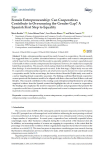Bastida M., Pinto L.H., Olveira Blanco A., Cancelo M. (2020). Female entrepreneurship: can cooperatives contribute to overcoming the gender gap? A spanish first step to equality. Sustainability, 14/03/2020, vol. 12, n. 6, p. 1-17.
https://doi.org/10.3390/su12062478
https://doi.org/10.3390/su12062478
| Titre : | Female entrepreneurship: can cooperatives contribute to overcoming the gender gap? A spanish first step to equality (2020) |
| Auteurs : | M. Bastida ; L.H. Pinto ; A. Olveira Blanco ; M. Cancelo |
| Type de document : | Article |
| Dans : | Sustainability (vol. 12, n. 6, March 2020) |
| Article en page(s) : | p. 1-17 |
| Langues : | Anglais |
| Langues du résumé : | Anglais |
| Catégories : |
Catégories principales 14 - SOCIOLOGIE ; 14.6 - Rôle de la FemmeThésaurus IAMM ENTREPREUNARIAT ; ACTIVITE COOPERATIVE ; GENRE FEMMES HOMMES ; FEMME ; ROLE DES FEMMES ; ECONOMIE SOCIALE ; ENTREPRISE ; METHODE DELPHI ; ESPAGNE |
| Résumé : | To date, entrepreneurship research has rarely focused on cooperatives. Recent research has suggested there is a positive association between cooperatives and women’s entrepreneurial activity based on the assumption that this model is especially suitable for women’s expectations and is favourable to their economic entrepreneurial development. However, few studies have empirically tested these propositions. This research, which analysed data from 264 Spanish cooperatives, confirms these findings. A mixed-methods approach was used. In the first stage, a Delphi study was run with 11 cooperative entrepreneurship experts to ask what factors may be decisive for women preferring a cooperative model. In the second stage, the factors derived from the Delphi study were used in a survey targeting female cooperative associates. The findings confirmed that female cooperative owners perceived this business model to be aligned with their values and best fit their work and lifestyle. This research contributes to the existing social entrepreneurship literature by providing empirical evidence from the Spanish context that highlights the role of women in cooperatives. The findings also emphasize the need for responsive policies and programmes that promote the cooperative model since it promotes female employment and women’s entrepreneurial activity even in periods of economic austerity. |
| Cote : | En ligne |
| URL / DOI : | https://doi.org/10.3390/su12062478 |







